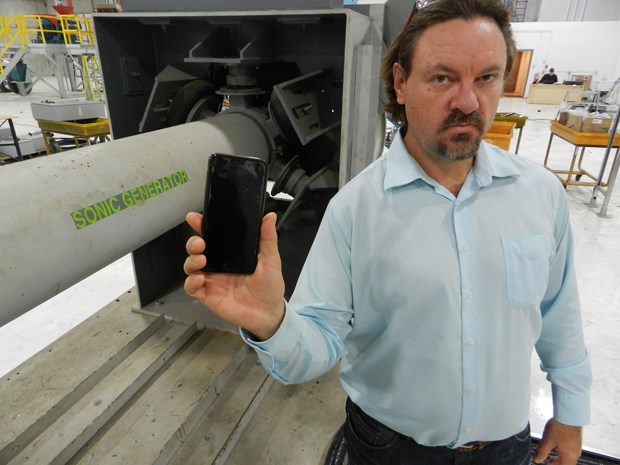A high-tech, Richmond-based company is hoping to make some noise in the electronics recycling world.
Actually, it’s using sound waves to break down materials in cellphones and computers in the hopes that one day soon all electronic devices will be made from recycled plastics and metals.
“Two years. I give it two years,” said Peter Holgate, founder and CEO of Ronin8, which is borrowing and adapting technology from the mining industry to produce what he claims is an environmentally sound method to recover 100 per cent of the glass, plastic and an assortment of precious metals from electronic devices and send them back through the supply chain.
What Ronin8 is using to achieve this is what’s called a sonic generator.
Essentially, it’s a 10-ton bar of steel with electromagnets on the exterior that excites molecules.
“So, this bar is not under stress, but it vibrates at 50 to 60 hz.,” Holgate said, as he showed the Newshis Ironwood area recycling plant, which is set to be officially opened Dec. 10, to the Newsrecently. “So, you have 10 tons of energy focused in three nodes and we can use that to separate or size reduce, sheer, and change the makeup of matter.”
When the material being recycled is broken down to that level, it is sorted by weight and collected.
Holgate said the method — using the sonic generator it acquired from mining company Placer Dome which was using it to remediate toxic soils — is much better than current ways to recycle e-waste, which can be harmful to the environment.
“They (Placer Dome) didn’t realize what they had. They had a Ferrari and they were trying to use it as a dump truck,” Holgate said, adding Ronin8 has tweaked the device for its needs and has several patents pending on the changes.
Plus, when there is an almost unlimited supply of electronics out there needing to be recycled — about 2 billion new cellphones are sold each year, according to CCS insight, an on line marketing publication — there’s gold in them there mounting waste piles, and a lot of other precious metals, too.
Traditional methods to recover those potential riches include incineration. But that requires harsh chemicals to extract the gold, silver, copper, aluminum, copper and platinum.
“Ninety-nine per cent of the time it (electronic waste) goes to a smelter. Either one in Quebec, another in Belgium, or in Japan,” Holgate said. “Circuit boards get burned. They get incinerated and the metals are lumped together, and then you need very aggressive assets to try and get them rid of them.”
That can be an extremely inefficient way of recycling, he added.
“You need cyanide and arsenic, hydrochloric acid to extract the materials afterwards,” Holgate said. “It’s a process from 200 years ago that we are using today.”
But is it worth the effort to scoop up old PCs, Macs, iPhones and Blackberrys?
Consider what is likely tucked inside your pocket or purse right now. An iPhone 5 contains about two cents worth of platinum, five cents of aluminum, 12 cents of copper, $1.58 in gold, and 36 cents of silver, according to Electronic Products Magazine.
And given that the Environmental Protection Agency (EPA) in the U.S. estimated that 152 million mobile device were discarded by American users in 2010 — 135 million were trashed and just 17 million were recycled, there’s plenty of supply on hand that can be tapped into that can make it more efficient than mining fresh materials.
“(electronic waste is) ubiquitous. It’s the fastest-growing waste stream in the world,” Holgate said.
According to research conducted by Yokohama Metal, a ton of ore from a gold mine produces a mere 5g of gold on average, while a tonne of discarded mobile phones yield 150g or more.
The research also indicated that the same volume of discarded mobile phones produces approximately 100kg of copper and 3kg of silver, as well as a number of other metals.
In addition to easing the burden on the environment that could represent, Holgate said it could also take the weight off a collective conscience since some precious metals are mined in notable conflict areas.
“We don’t need these mines in developing countries with shady characters because there’s enough metal dug out of the ground already. It’s all here,” Holgate said.
And that’s only the cellphone market. Add in computers, solar panels and fibre optic cables and the resources that can be harvested and recycled grows even more, Holgate said.
So then, there’s a good supply of recovered materials.
Are there buyers?
Right now, some of the pure metals to be collected in Ronin8’s Richmond plant will be sent to the Royal Canadian Mint.
“They take our gold, platinum and palladium. They are our channel partner for the noble metals. And we have brokers for the copper, silver and nickel mix,” Holgate said. “And the non-metal fraction we produce — the polymers — are currently going into a race track being built in Osoyoos, as well as things like new roofing materials.”
When there is a sufficiently larger supply of recycled goods using his company’s process Holgate expects it will draw the interest of the large electronics manufacturers.
To get to that point, a number of much larger, 100,000-square-foot sites that can handle 12,000 tons of material annually will be needed, and Ronin8 has plans to build one in Williams Lake.
In comparison, the Richmond facility is expected to have a capacity of about one ton a day.
It may take a while — perhaps longer than the 24 months Holgate estimates — but the lustre of achieving a net stream of recycled materials to feed new manufactured electronics could be significant.
“Imagine the marketing draw a Dell or an Apple would have when they say their new computer is made entirely from recycled materials?” Holgate said.



